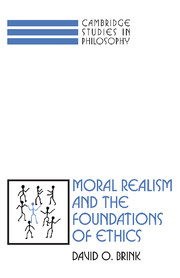Book contents
- Frontmatter
- Contents
- Preface
- 1 INTRODUCTION
- 2 MORAL REALISM AND MORAL INQUIRY
- 3 EXTERNALIST MORAL REALISM
- 4 DOES MORAL REALISM MATTER?
- 5 A COHERENTIST MORAL EPISTEMOLOGY
- 6 MORAL REALISM AND THE IS/OUGHT THESIS
- 7 A POSTERIORI OBJECTIONS TO MORAL REALISM
- 8 OBJECTIVE UTILITARIANISM
- Appendix 1 Must an infinite regress of justification be vicious?
- Appendix 2 Coherence, internalism, and externalism in epistemology
- Appendix 3 The is/ought thesis and intuitionism
- Appendix 4 Rawlsian constructivism
- Bibliography
- Index
Appendix 4 - Rawlsian constructivism
Published online by Cambridge University Press: 11 January 2010
- Frontmatter
- Contents
- Preface
- 1 INTRODUCTION
- 2 MORAL REALISM AND MORAL INQUIRY
- 3 EXTERNALIST MORAL REALISM
- 4 DOES MORAL REALISM MATTER?
- 5 A COHERENTIST MORAL EPISTEMOLOGY
- 6 MORAL REALISM AND THE IS/OUGHT THESIS
- 7 A POSTERIORI OBJECTIONS TO MORAL REALISM
- 8 OBJECTIVE UTILITARIANISM
- Appendix 1 Must an infinite regress of justification be vicious?
- Appendix 2 Coherence, internalism, and externalism in epistemology
- Appendix 3 The is/ought thesis and intuitionism
- Appendix 4 Rawlsian constructivism
- Bibliography
- Index
Summary
In his writings since A Theory of Justice, Rawls has, among other things, made a number of claims about the status and justification of his theory of justice. I would like to consider a possible epistemological objection to moral realism based on Rawls's recent Dewey Lectures, “Kantian Constructivism in Moral Theory” (1980). As we shall see, it is difficult to know whether the Dewey Lectures contain any kind of challenge to moral realism or any metaethical view. If not, we need not worry about Rawls's claims there. But, I shall argue, the Dewey Lectures can be read as containing such a challenge (and are so read by a number of people). If so, Rawls's position merits our attention, not only because of the influence exerted by his views but also because he continues to accept the sort of coherence theory of justification in ethics that I have been defending. These are reasons to explore the bearing of Kantian constructivism on my defense of moral realism.
Since he wrote his article “Outline for a Decision Procedure in Ethics,” Rawls has advocated a coherentist moral epistemology according to which moral and political theories are justified on the basis of their coherence with our other beliefs, both moral and nonmoral (1951: 56, 61). A moral theory that is maximally coherent with our other beliefs is in a state that Rawls calls “reflective equilibrium” (1971: 20). In A Theory of Justice, Rawls advances two principles of justice and claims that they are in reflective equilibrium.
- Type
- Chapter
- Information
- Moral Realism and the Foundations of Ethics , pp. 303 - 322Publisher: Cambridge University PressPrint publication year: 1989
- 1
- Cited by



